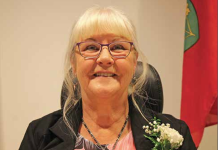HKPR district health unit board member Bill Cane asked the Sept. 15 board meeting what they should be doing about a “defeatist attitude” regarding the effectiveness of further COVID-19 vaccines.
Cane, from Northumberland County, asked if anyone else was noticing a trend whereby, “all kinds of people are saying, ‘I was triple vaxxed and got it anyway, we’re all going to get it anyway, what’s the sense?” He asked his colleagues what their response should be.
Chief medical officer of health, Dr. Natalie Bocking, said the number of people getting immunized against the virus has dramatically declined. She said while the first two shots and a booster provide “very good protection” from her perspective, data indicates people can still get severely ill without subsequent shots.
“Protecting yourself against severe illness by getting the bivalent dose this fall makes sense to me and is an easy thing to do.” She added it will help protect the health care system overall. “The fundamental message is look after yourself, your family and your community, but I agree we are struggling with our messaging because we know people are tired.”
Cane asked if it was a question of getting slightly ill or really sick. Bocking said getting subsequent doses could prevent people from going to hospital, which frees up more hospital beds for other things, including elective surgeries. “If it protects other members of the community, it’s a step worth taking.”
Haliburton County board member, Dysart et al mayor Andrea Roberts, likened it to “roulette.”
“It’s not fair to have a laissez faire attitude,” she said. She added they were “ambassadors” of public health who should be promoting vaccines. She said no one could predict the future and “heaven forbid” there could be a new variant this fall.
In her report to the board, Bocking said “at the health unit, the pandemic still has an ever-present presence … and still a lot of work and effort that we need to be putting in to address COVID-19 locally. We don’t expect COVID to be leaving us any time soon.”
She said this summer’s seventh wave is only now receding, with the number of outbreaks at long-term care homes and retirement residences down at the end of the first week of September and positivity rates also declining.
She said they got up to 14-15 outbreaks at the peak, down to five as of the meeting. The positivity rate had gone from 16.9 per cent to 9.7 per cent. She said wastewater trends had also stabilized, including in Minden.
“As much as we see COVID-19 becoming less of a presence in our overall lives, it’s still impacting certainly those most vulnerable in our community. We know we have good immunization coverage in long-term care homes so thankfully we’re not seeing the same levels of illness, hospital admissions and deaths than we did in the first waves of the pandemic, but we are still seeing some.”
She added some people are saying Omicron is like a cold, but there have been more hospitalizations and deaths from it, than influenza in any given year.
As for the fall, she suggests people keep up with COVID-19 as well as flu shots since they are anticipating “a challenging fall respiratory season.”
She urged board members to take the message home, “if you’re sick this fall, that you stay home.” She said the vaccine landscape is more complicated and people should ask their primary health care provider or the health unit if they have questions.





